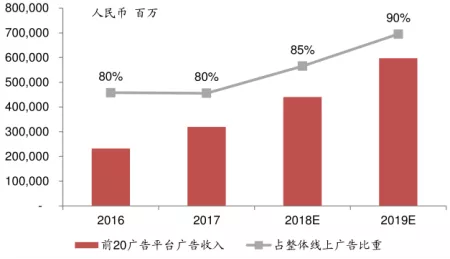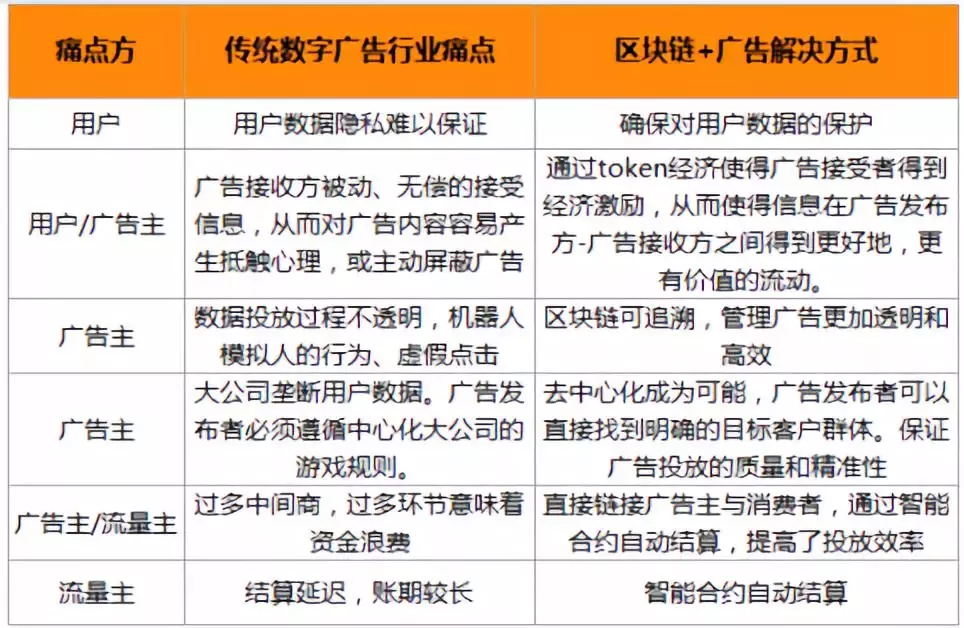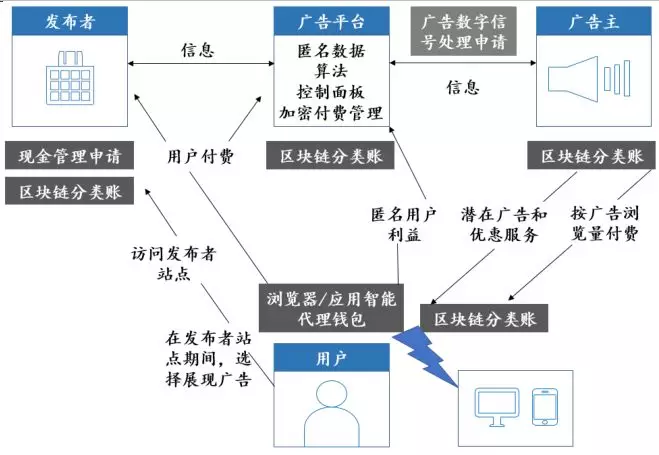Chain advertising, new harvesters in the advertising market
When online advertising became a "chain" of advertising, the crisis of traditional digital advertising seemed to follow.
On March 26, the leading American chocolate manufacturer Hershey officially joined the AdLedger Block Digital Advertising Alliance. The alliance was founded in 2018 by IBM, Tegna (American head media company) and blockchain company MadHive. The alliance also includes the famous French media group Publicis Media. Alliance members hope to increase the transparency of advertising data and delivery processes under the shape of blockchain technology.
In early 2018, Comcast, the largest cable company in the United States, and the NBC Universal, Disney and Channel4 (UK Public Service Television), Altice USA and other companies jointly released the Blockchain Insights Platform (blockchain insight) platform, which can match the audience database. Through smart contracts for the purchase and delivery of ads, they hope to better plan, execute and measure the effectiveness of ad delivery by applying the underlying blockchain technology.

- April 16 market analysis: the bullish offensive is weak, the air force morale is rainbow
- Gu Yanxi: The dusk of the Nasdaqs
- Polkadot Shanghai Review: Gavin Wood and other guests gave a speech on PPT
Image from pixabay
In October last year, Japanese automaker Toyota worked with blockchain advertising analysis company Lucidity to increase the transparency of digital advertising campaigns through blockchain technology and reduce the cost of advertising.
More than foreign countries. In January of this year, Keda shares began to focus on building the blockchain media entrance, and jointly launched a blockchain industry fund with a scale of 1 billion with Jintai Venture Capital, HC Group, and Qizhizhi, with “Industry Fund + Entrance”. The format of media platform + research institute realizes the integration of blockchain technology and advertising marketing.
Not long ago, Xiaomi Technology Company proposed the construction of advertising technology blockchain community alliance with data collaboration, anti-fraud and effect monitoring as the main scenarios.
In this fast-changing iterative society, both enterprises and individuals are madly seeking change and integration, and hope that they will not be driven off by the times.
Just full of ideals, but also need technology to support. Blockchain + advertising is the same.
The traditional "advertising triangle" is difficult to break
There is a very famous question circulating in the advertising industry: "I know that half of my advertising costs are wasted, but I don't know which half?"
This question actually contains two meanings. One is whether my advertisement "accurately" reaches the user, and the second is whether my advertisement is "effective" for the audience.
Since the advertisers, traffic owners, and users all have natural mutual distrust, the traditional advertising triangles bring many valuable intermediate links such as advertisement verification, data monitoring, and advertisement interception. The result is improved. Cost, reducing the benefits of all parties.

Image from pixabay
In addition, the false clicks of the traffic owner, the recipients of the advertisements (users) passively and freely accept the advertising information, and the data monopoly of the advertising platform, these are the dilemmas of traditional advertising.
According to iResearch statistics, in 2018, China’s online advertising market share was 401 billion yuan. Tencent, Baidu, headline, Weibo, and Alibaba’s five head enterprises achieved total advertising revenue of 332.087 billion yuan in 2018, while the top 20 The market share of head advertising platforms reached 85%. In the United States, only two companies, Facebook and Google, have to eat two-thirds of the entire Internet advertising market.
Especially after entering the stock era, this pattern of oligopoly has been further aggravated with the increase of traffic barriers. According to the Huachuang Securities Research Report, online advertising resources will be further concentrated in the head in 2019, and the living space of SMEs in the industry will be further compressed.

Top 20 market share of online advertising market Source: CICC Research Institute
Under the data monopoly, the strong is strong and the weak is weaker. The Matthew effect has become the helplessness of the survivors of this industry.
On the other hand, according to data released by the IBM Business Research Institute, in the current advertising industry, only 38% to 46% of each advertising expenditure eventually reached the expected media channel. At the same time, in 2018, advertisers lost as much as $19 billion in advertising fraud (click cheating), and by 2022 this loss is expected to be as high as $44 billion.
Advertising mismatches, user blocking, traffic fraud, user information disclosure, data confusion and settlement delays are issues that need to be addressed in the development of digital advertising.
While artificial intelligence and big data technologies can drive the advertising industry to move toward precision marketing and smart marketing, the latter may be able to eradicate lesions relative to the blockchain's traceable, non-tamperable, peer-to-peer technology and smart contract applications.
RTBAsia, an advertising verification technology company specializing in brand safety and invalid traffic screening, its CEO Andy also told Zinc Link that the current Internet advertising industry's traffic authenticity and pricing science issues need to be addressed. He believes that the number of advertisements is too much, and it is also an excessive consumption of consumers.
“The current pricing methods for advertising are relatively extensive. There are no such quality factors as ineffective traffic, visibility of advertisements, and security of the advertising environment. The role of the blockchain is to mobilize the public to participate in the most objective and accurate measurement, making pricing More scientific."
The application of blockchain technology has allowed Andy to see the breakthrough in the digital advertising industry.
Blockchain + advertising industry breakout
The convergence of blockchain and advertising industry solves many pain points in the advertising industry. Specifically, the Node Research Center believes that the advertising industry can benefit from blockchain technology in terms of user portraits, program transparency, fraud prevention, structural optimization, and user incentives.

Comparison of traditional digital advertising in blockchain advertising Source: Node Research Center
According to the zinc link, the current advertising is accurately delivered, mainly through the user's browser cookie, the mobile device's advertising identifier or device ID, to simulate the user's real information data, such as age, gender, address, salary level, dining habits and so on. But because the data is not public, the user's portrait is not accurate.
For advertisers, the use of non-public data also requires additional fees.
After using blockchain technology, advertisers have the ability to build user portraits directly from users, collecting information that all users are willing to share. The decentralized setting of the blockchain allows advertisers to pay directly to the target groups that view the ads.
This means that companies will move toward smarter advertising payments and establish direct links with potential customers to achieve accurate promotions. This also gives the market a stronger ability to meet the real needs of users.

Image from pixabay
Blockchain technology can also be solved for opaque, data fraud, and advertising fraud in traditional models. Thanks to the transparency of the blockchain, traceability and other characteristics, advertisers can directly determine whether the person watching the advertisement is their target user, and accurately find the target object while eliminating malicious clicks. In addition, the decentralization of the blockchain and the transparency of data transparency can also balance the advertising user experience and commercialization, forming a reliable data flow closed loop.

Blockchain advertising platform operation method Source: Pacific Securities
In addition, after the data is on the chain, it liberates the ownership of the data, so that it no longer belongs to a certain collection center, so that the fully centralized data center no longer has a complete competitive advantage. The data monopoly is broken.
However, one idea still involves user privacy issues. From the moment the Internet was born, data privacy protection became a tricky issue. Wen Zhen, the chief scientist of Zhaopin's recruitment of big data and algorithms, believes that users' privacy data should be protected like financial assets, and that hackers and other roles can be prevented through encryption and strict auditing.
The technical nature of the blockchain makes it an advantage in data privacy protection.
First, the blockchain can reduce many intermediary links, which naturally reduces the risk of data privacy leaks. The blockchain's flood control makes personal data highly stable, and the blockchain exchanges data based on addresses rather than personal identities, and it also protects personal privacy.
In addition, in a blockchain network, the user is not a completely passive party and he has the initiative to use the data. Applicable in the advertising industry, it will be a good solution to the security of user privacy data and the use of data for free.

Image from pixabay
Andy told Zinc Link that from the current market point of view, the development of blockchain + advertising is mainly two. One is the advertising platform that serves the entire blockchain ecology. The service target is mainly various DApps, which are born in Within the industry, comparing existing platforms is another kind of complete innovation; there is also the use of blockchain technology to improve the existing Internet advertising industry.
Whether it is innovation or improvement, the emergence of blockchain brings new genes to the advertising industry.
Blockchain empowers industry, technology is the core
Dreams are beautiful, and technology is the key to keeping up.
In 2017, the blockchain + advertising concept was born. In the bubble of the "digital currency" crazy speculation, there is not much concern for technology. Since the creation of Bitcoin by Nakamoto in 2008 and the concept of blockchain, even though the blockchain has evolved into the current era of smart contracts, technical problems still exist.
As far as the zinc link is concerned, the current blockchain + advertising model has many technical problems:
The first is that the underlying public chain and other underlying structures are not performing well and cannot support the corresponding functional development. The blockchain can not quickly analyze or process real-time advertising transactions. Second, in terms of Token user incentives, once the application model is not handled properly, it will face policy and legal risks. Third, how to attract user data to autonomous large-scale uplink, after all, at present, want to reflect the value of the blockchain, users are the key. Nowadays, a centralized organization or company with a large amount of user data is relatively simple in terms of chaining, but the final form will be in the form of a private chain or a coalition chain (cartel oligopoly).

Image from pixabay
In addition, RTBAsia CEO Andy told Zinc Link that it is still too early to create a new form of advertising for “blockchain+advertising”.
Andy believes: "The next new model of Internet advertising wants to be born , only when the blockchain is used to take the consumer's personal information ownership back to the consumer's own hands. At present, personal privacy and being taken Come back and store it in some future proprietary blockchain mobile hardware, the time is still far away, but technology is always the core element."
No matter what form it will eventually be presented, at least the current industry development is moving in a new direction.
In early February of this year, the China Advertising Association officially launched the "General Invalid Traffic Data" (GIVT Data) service, using DIF (Distributed Invalid Traffic Filtering Platform) to build a blacklist mechanism and system based on blockchain to improve anti-abnormal traffic. Accuracy and efficiency.
On the afternoon of March 30, the National Network Information Office released the first batch of domestic blockchain information service record number, and its announcement marked an important step towards the development of China's blockchain industry. It can promote the entire industry environment from pure speculation to the atmosphere of technological exploration.

Image from pixabay
A surnamed Li who worked in the blockchain industry for many years told Zinc Link that after more than a year of market calm, the current blockchain technology has also been greatly developed. Only now, the blockchain industry needs to find a point of integration with the real economy or traditional industries, considering how to put technology into the market.
"Technology is always the core is no problem, not the blockchain technology that people often say is not good. I think many people have such a lagging market reaction because they don't know much about technology," he added.
Blockchain wants to be empowered in the advertising industry, and technology is the core and the key.
Just like the Internet in the early 21st century, after the cleansing of the lead, the technology that has been deposited has become the cutting edge of today's changing world.
Blockchain technology, who said it is not the next "Internet"?
Text: Qi Xueyuan
Editor: Sun Pengfei
We will continue to update Blocking; if you have any questions or suggestions, please contact us!
Was this article helpful?
93 out of 132 found this helpful
Related articles
- April 16 market analysis: EOS, BCH is still strong, can LTC return to the king again?
- April 16th market analysis: the new love between the exchange and the project side
- Research: Trading robots are running wildly, and retail investors are “cut” between invisible
- Babbitt column | In-depth analysis of full homomorphic encryption algorithm
- If Nakamoto has not been anonymous, will Osho will still jump out of the mouth of the entire BSV?
- The brain hole of the blockchain is wide open: three-body, KK and interstellar hegemony
- LedgerX applies for a designated contract market license, or will be the first to launch a physical settlement of Bitcoin futures contract products






